Plenary Bios and Abstracts
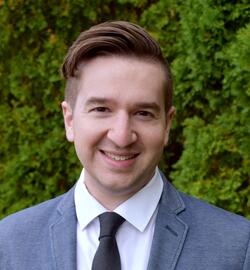 Nathan P. Chase is Assistant Professor of Liturgical and Sacramental Theology at the Aquinas Institute of Theology in St. Louis, MO. He has contributed a number of articles to the field of liturgical studies, including pieces on liturgy in the early Church, initiation, the Eucharist, inculturation, and the Western Non-Roman Rites, in particular the Hispano-Mozarabic tradition. His first book The Homiliae Toletanae and the Theology of Lent and Easter was published in 2020. Nathan’s most recent monograph is titled The Anaphoral Tradition in the ‘Barcelona Papyrus’ (Brepols, forthcoming).
Nathan P. Chase is Assistant Professor of Liturgical and Sacramental Theology at the Aquinas Institute of Theology in St. Louis, MO. He has contributed a number of articles to the field of liturgical studies, including pieces on liturgy in the early Church, initiation, the Eucharist, inculturation, and the Western Non-Roman Rites, in particular the Hispano-Mozarabic tradition. His first book The Homiliae Toletanae and the Theology of Lent and Easter was published in 2020. Nathan’s most recent monograph is titled The Anaphoral Tradition in the ‘Barcelona Papyrus’ (Brepols, forthcoming).
“Oleoculture: The Production, Ritual Use, and Reservation of ’the Fruit of the Olive’ in the Early Church”
Anointing with perfumed and non-perfumed olive oil is an ancient part of the Christian ritual tradition. While the rites in which the different oils in the Christian tradition are used, like the anointing of the sick and confirmation/chrismation, have been extensively studied by scholars, the theology and ecclesiology of the oils have not. A study of the use of oil in the Christian ritual tradition cannot ignore the larger oleoculture in which the Church’s use of oil emerged. The economic and material significance of oil in antiquity is essential to the theology and ecclesiology of the oils. A turn to the ancient vessels in which oils were stored can also shed further light on how Christians understood and used these oils. This paper will look at how the production and distribution of oil in the larger social context shaped the early use of oil, particularly chrism, in Christian rituals.
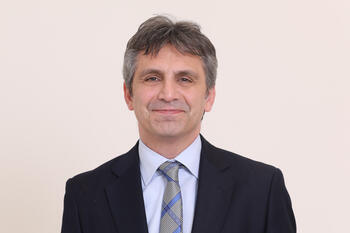 Ephrem Aboud Ishac is a researcher and a lecturer on Syriac Liturgical Studies, focusing on the Syriac liturgical texts in manuscripts. After obtaining a Ph.D. in Liturgy from the Holy Spirit University of Kaslik, Ephrem was engaged in postdoctoral projects in Graz and Bologna. Having lectured in Salzburg and Vienna, in 2020 he was a short-term fellow at the Yale Institute of Sacred Music (ISM), and in the academic year of 2022-23, Ephrem has been back to ISM as a research scholar fellow, where in addition to his research, he gave talks, and taught on the Eastern Christian Liturgical Rites.
Ephrem Aboud Ishac is a researcher and a lecturer on Syriac Liturgical Studies, focusing on the Syriac liturgical texts in manuscripts. After obtaining a Ph.D. in Liturgy from the Holy Spirit University of Kaslik, Ephrem was engaged in postdoctoral projects in Graz and Bologna. Having lectured in Salzburg and Vienna, in 2020 he was a short-term fellow at the Yale Institute of Sacred Music (ISM), and in the academic year of 2022-23, Ephrem has been back to ISM as a research scholar fellow, where in addition to his research, he gave talks, and taught on the Eastern Christian Liturgical Rites.
“Expensive Blessings in the Syriac Liturgical Tradition”
This presentation will trace the different arguments in the Syriac liturgical literature about the financial questions in the liturgical life of the Syriac Church community; how money and financial calculations were employed sometimes in the liturgical commentaries and other theological literature such in several patristic homilies, to persuade and encourage the faithful ones for sacrificing some of their material possessions while focusing and looking for their spiritual wealth on earth as well as in heaven.
Money as a financial means for living was also used to continue the liturgical life in the Syriac church. One might ask several questions such as: why would be necessary to fund the expensive liturgical celebrations? Historically, the Syriac believers had financed also several expensive liturgical projects in history, such as producing many luxurious lectionaries, scribed by golden inks and decorated with professional miniatures. In fact, the Syriac Fathers such as Severus of Antioch (d. 538), had taught in several homilies about the spiritual blessings that the donors will be rewarded for their financial generosity while helping the poor and supporting the Church expenses. All these have been building a theological understating to the importance of giving on a hope for gaining some blessings.
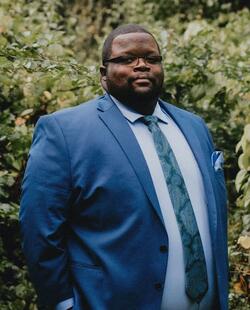 Braxton Shelley came to Yale to teach, to continue his path-breaking work as a theorist of African American sacred music, and to serve as faculty director of the new Interdisciplinary Program in Music and the Black Church housed in the ISM. He is a scholar, an ordained minister, and an experienced church musician who will bring to Yale University much-needed attention to a vital and under-researched musical tradition.
Braxton Shelley came to Yale to teach, to continue his path-breaking work as a theorist of African American sacred music, and to serve as faculty director of the new Interdisciplinary Program in Music and the Black Church housed in the ISM. He is a scholar, an ordained minister, and an experienced church musician who will bring to Yale University much-needed attention to a vital and under-researched musical tradition.
A native of North Carolina, Prof. Shelley graduated with highest distinction from Duke University where he majored in music and minored in history. He then entered the Ph.D. program in the History and Theory of Music at the University of Chicago. While finishing his Ph.D., he also earned a Master of Divinity degree at the University of Chicago Divinity School, upon which he was ordained in the Missionary Baptist church. In 2017, he was appointed assistant professor of music at Harvard University, where he has taught since.
Prof. Shelley is one of the most celebrated musicologists of his generation and on his way to be one of the most celebrated in any generation. He was awarded the Paul A. Pisk Prize in 2016 by the American Musicological Society (AMS) for the best paper by a graduate student. In 2018, he won the Dean’s Distinguished Dissertation Award from the University of Chicago’s Division of the Humanities. His field-changing article “Analyzing Gospel,” which appeared in the Journal of the AMS, was awarded prizes from all three major American professional societies for music studies: the Einstein Award from the AMS, the Kunst Prize from the Society of Ethnomusicology, and the Adam Krims Award from the Popular Music Interest Group of the Society of Music Theory. Recognition from these three scholarly organizations illustrates the extraordinary interdisciplinary expertise Prof. Shelley brings to our campus.
Prof. Shelley’s first book, Healing for the Soul: Richard Smallwood, the Vamp, and the Gospel Imagination, was published this year by Oxford University Press and was hailed by Prof. Cornel West as “the best book written on Gospel Music.” He added, “This instant classic forever changes modern scholarship in contemporary music and Black cultural performance.” Prof. Guthrie Ramsey of the University of Pennsylvania wrote, “This profound and illuminating book could only have been written by someone who’s spent years on the cultural frontline: in the pulpit, behind a Hammond B-3 organ, and immersed in the archives of gospel music’s history and lived experiences.”
A second book, under contract with the University of California Press, is entitled An Eternal Pitch: Bishop G.E. Patterson and the Afterlives of Ecstasy. It analyzes the great preacher’s musical style, his use of radio and other media, and the digital reverberation of his ministry after his death in 2007.
Prof. Shelley already has nearly a dozen articles and book chapters in press or published. He is also a frequent guest lecturer and clinician.
“Sharing Space, Making Place: Gospel Materiality and Black Life Online”
The presentation thinks about the intercalation of musical and virtual spaces in Black religious digital cultures.
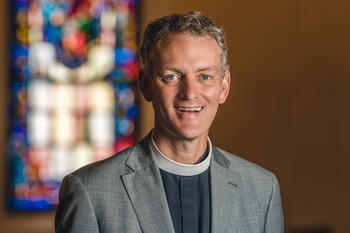 Nicholas Beasley is the rector of St. John’s Episcopal Church, in Columbia, South Carolina. A graduate of Yale Divinity School, he earned a PhD in History at Vanderbilt University in 2007. He has published reviews, articles, and a book on Christian worship and society in the early American South and British Caribbean. He received graduate grants and fellowships from the Historical Society of the Episcopal Church, the Episcopal Church Foundation, and the Vanderbilt Center for the Americas.
Nicholas Beasley is the rector of St. John’s Episcopal Church, in Columbia, South Carolina. A graduate of Yale Divinity School, he earned a PhD in History at Vanderbilt University in 2007. He has published reviews, articles, and a book on Christian worship and society in the early American South and British Caribbean. He received graduate grants and fellowships from the Historical Society of the Episcopal Church, the Episcopal Church Foundation, and the Vanderbilt Center for the Americas.
“Anglican Liturgy in British Slave Societies, 1650-1780”
Barbados, Jamaica, and South Carolina were slave societies in a British Atlantic world characterized by the pursuit of profit, the use of violence, and a profound inequality. This British plantation world featured a translation of Anglican liturgical ways to the Americas that was at times studied, at other times unconsidered, and periodically contested. Exploring the sacraments, church seating, the church calendar, and burial ritual, this paper will show how the Anglican ritual repertoire was a means of exploring, establishing, and contesting emerging American systems of race. The Christian ritual vocabulary of one early modern Protestant tradition thus offered Europeans, Africans, and their descendants a place of encounter and estrangement in the developing Atlantic world.
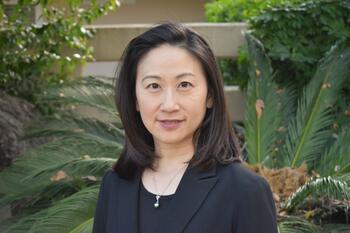
“Cost of Practicing Religion”
Because religious practices have arisen within specific economic and social contexts, it is worth examining how economics has shaped religious practice. This does not in any way downplay or mitigate the theological or spiritual impetus for religious practice but rather seeks to recognize the economic and material factors affecting the practice, even in small but significant ways. The cost of practicing religion became an acute issue during the Reformation, because of the critiques against the Catholic church’s materials and luxury and the limited resources of many emerging Protestant churches. The efforts to balance material economies and spiritual ideals required repeated interventions and constant negotiations, especially as reform required the repurposing of material objects for new religious rituals.
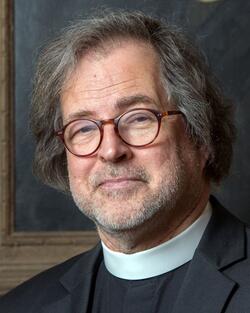 Andrew McGowan is Dean of the Berkeley Divinity School at Yale and McFaddin Professor of Anglican Studies at Yale Divinity School. An Anglican priest and scholar of early Christian food and ritual, his work has appeared in leading journals and in his books including Ascetic Eucharists (Oxford, 1999) and Ancient Christian Worship (BakerAcademic, 2014). He also regularly makes bread and occasionally teaches bread-making.
Andrew McGowan is Dean of the Berkeley Divinity School at Yale and McFaddin Professor of Anglican Studies at Yale Divinity School. An Anglican priest and scholar of early Christian food and ritual, his work has appeared in leading journals and in his books including Ascetic Eucharists (Oxford, 1999) and Ancient Christian Worship (BakerAcademic, 2014). He also regularly makes bread and occasionally teaches bread-making.
“True Bread: Ancient Rabbis, Medieval Patriarchs, and the Modern Magisterium on Leavening, Fermentation, and Gluten”
The nature of eucharistic bread has proven divisive among Christians, especially during the Great Schism of the 11th century, and then at the Reformation in the 16th. More recently, responding to the issue of celiac disease, the Roman Catholic Church has specified that to be valid matter for the Eucharist bread must contain at least some gluten, the protein complex that enables leavening. While the published rulings of the Magisterium are brief, their logic reflects an insistence on the bread of the Eucharist being made from wheat, and by implication on the capacity of wheat itself to be leavened. These perennial issues and debates refer in theory to commemoration of the last supper of Jesus and the place of unleavened bread at the Passover. Yet the ancient evidence suggests room for critical reflection on the assumptions as well as the controversies. Grains other than wheat were excluded at Passover in leavened or leaven-able form, and hence could properly used for matzah. While placing these historical instances in conversation, this lecture will examine the basic question of just what constitutes (eucharistic or other) bread, and the ways that the material quality of bread is important to the Eucharist, as memorialization of the last supper and otherwise.
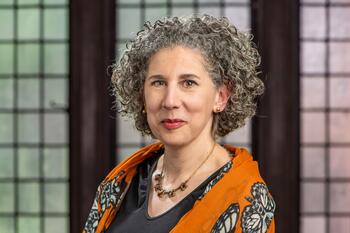 Laura Nasrallah is Buckingham Professor of New Testament Criticism and Interpretation, jointly appointed in the Department of Religious Studies and the Divinity School at Yale. Her forthcoming book is titled Ancient Christians and the Power of Curses: “Magic,” Aesthetics, and Justice (Cambridge University Press) and she is working on a new book titled The Letters of Paul: A Love/Hate Story (Eerdmans).
Laura Nasrallah is Buckingham Professor of New Testament Criticism and Interpretation, jointly appointed in the Department of Religious Studies and the Divinity School at Yale. Her forthcoming book is titled Ancient Christians and the Power of Curses: “Magic,” Aesthetics, and Justice (Cambridge University Press) and she is working on a new book titled The Letters of Paul: A Love/Hate Story (Eerdmans).
“Christ the New Song: Music and Incantation, Cure and Gospel”
Some early Christians described Christ as both musician and new song. How do we make sense of this idea? While early Christian engagement with scriptures provides a helpful context, this idea is most richly understood in the broader context of ancient Mediterranean ritual and liturgy, where incantations and hymns not only resonated in the throat but were also materially inscribed on lead, stone, and papyrus. The Christian idea of Christ as both musician and new song, and Christian practices of singing and incantation, take part in a broader culture that is hopeful about song’s ability to transform and cure—to change, materially—the human body.
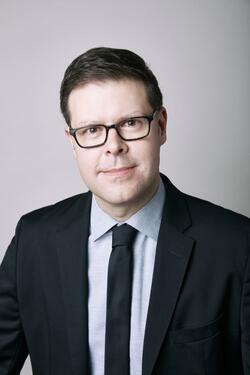 Antonio Eduardo Alonso is Aquinas Assistant Professor of Theology and Culture at Emory University’s Candler School of Theology where he also serves as the inaugural Director of Catholic Studies. In 2019 he was awarded the Catherine Mowry LaCugna Award for the best academic essay in the field of theology within the Roman Catholic tradition from the Catholic Theological Society of America. His first book, Commodified Communion: Eucharist, Consumer Culture, and the Practice of Everyday Life (Fordham University Press, 2021), was awarded the Hispanic Theological Initiative Book Prize. His second book, The Intimate Notion of Things: Material Transformations in U.S. Catholicism since Vatican II (Fordham University Press, 2025) will focus on the theological significance of the transformation of Catholic material culture in the wake of the Second Vatican Council’s liturgical reforms. In addition to his scholarly work, Dr. Alonso is also a widely-published, Latin-Grammy nominated composer of sacred music.
Antonio Eduardo Alonso is Aquinas Assistant Professor of Theology and Culture at Emory University’s Candler School of Theology where he also serves as the inaugural Director of Catholic Studies. In 2019 he was awarded the Catherine Mowry LaCugna Award for the best academic essay in the field of theology within the Roman Catholic tradition from the Catholic Theological Society of America. His first book, Commodified Communion: Eucharist, Consumer Culture, and the Practice of Everyday Life (Fordham University Press, 2021), was awarded the Hispanic Theological Initiative Book Prize. His second book, The Intimate Notion of Things: Material Transformations in U.S. Catholicism since Vatican II (Fordham University Press, 2025) will focus on the theological significance of the transformation of Catholic material culture in the wake of the Second Vatican Council’s liturgical reforms. In addition to his scholarly work, Dr. Alonso is also a widely-published, Latin-Grammy nominated composer of sacred music.
“Mass Appeal: Music, Materiality, and the Market in the Postconciliar U.S. Catholic Church”
Through the curation of music in hymnals, missalettes, and songbooks in the wake of Vatican II, the convictions of liturgical reformers became material in new ways. Power over what was sung in parts of the Roman Catholic Mass increasingly included a more diverse and diffuse set of authorities: publishers, lay composers and church musicians, and more. This paper argues that the production, marketing, and selection of liturgical music in the United States in the postconciliar church materializes theological ideas about inculturation, inclusion, tradition, and renewal that now compete in an open market in a way that gives lay Catholics a limited yet significant voice in the liturgical tradition of the Church.